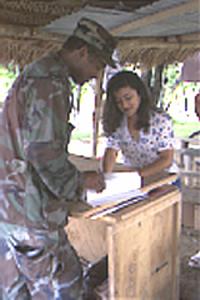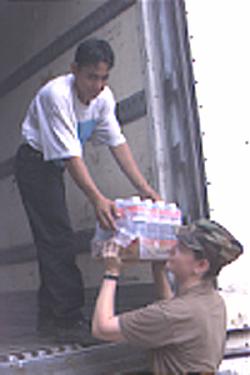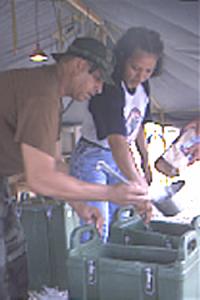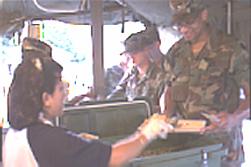
Cooks: Together
By Master Sgt. Jack Lee
203rd Military Public Affairs Det., Wichita, Kan.
 |
| Food service NCOIC Master Sgt. Madison Rayford, 420th Engineer Brigade, Bryan, Texas and Brenda Adalgisa, Guatemalan KP, discuss the food schedule for the upcoming week. Rayford, from Huntsville, Texas, provides a hot breakfast and supper to more than 250 Army Reservists on annual training during operation New Horizons '99. (U.S Army photo by Master Sgt. Jack Lee, 203rd MPAD, Wichita, Kan.) |
PUERTO BARRIOS, Guatemala -- A multinational force is quietly working behind the scenes at base camp Motagua, home to reserve soldiers on annual training while participating in Operation New Horizons '99. The American cooks and Guatemalan workers brave the stifling heat in the Mobile Kitchen Trailer (MKT) to feed over 250 soldiers a hot breakfast and supper everyday.
Spec. Kimberly Row, 308th Quartermaster Company, Washington, Iowa, is a light-wheeled vehicle mechanic, but works as a cook here. She's the one with the friendly smile and kind words for the soldiers that enter the MKT.
"I was given a choice between three jobs here, and cooking seemed to be the best job," Row said, with a shrug and a smile. "At first it was iffy, but now, it's not so bad. I've learned my way around and I don't have to ask as much any more."
Working with the Guatemalans has it's own rewards, Row said. "They are very hard working and energetic people who are always ready to lend a hand. I don't speak any Spanish, and most of the Guatemalans don't speak English, so there is a bit of a language barrier. I have learned 'un poco mas' - a little more. When I do talk to them, I don't speak in complete sentences and that seems to help them understand."
 |
| Winston Hernandez, Guatemalan KP, hands Spec. Kimberly Row, 308th Quartermaster Company, Washington, Iowa, a case of bottled water from the refrigerated trailer. Bottled water is used for all cooking at base camp Motagua during the humanitarian mission, New Horizons '99. (U.S Army photo by Master Sgt. Jack Lee, 203rd MPAD, Wichita, Kan.) |
A Task Force Motagua, headquarters staff member, Master Sgt. Madison Rayford, 420th Engineer Brigade, Bryan, Texas, food service non-commissioned - officer-in-charge, arrived here in early April and has worked with the Guatemalans since. "I find these people very conscientious about their jobs here, all pitching in to get the job done," Rayford said.
The soldiers are part of the expanded series of New Horizons '99 exercises being conducted throughout Central America to provide relief assistance and humanitarian aid in the wake of the devastation caused by Hurricanes Georges and Mitch. As part of their training mission, New Horizons soldiers are constructing schools, clinics, community centers and dikes; restoring roads and water crossings; and providing medical treatment to the people of Guatemala. Through cooperative efforts between the Guatemalan and U.S. governments, both host nation military forces and New Horizons personnel are working together to complete the projects.
Jose Alvarez, Guatemalan civilian supervisor, said that he selected the KPs based on experience. "They must have worked in a cafeteria or restaurant before they were hired."
To begin working at the dining facility, the Guatemalans had to pass a TB and HIV test, and a general health screening certification.
|
|
| Tray in hand, 1st Lt. Steven Foster, 203rd Mobile Public Affairs Detachment, Wichita, Kan., enters the Mobile Kitchen Trailer at base camp Motagua, Puerto Barrios, Guatemala, while on humanitarian relief duty with New Horizons '99. Serving Foster is Maria Garcia, a Guatemalan KP. (U.S Army photo by Master Sgt. Jack Lee, 203rd MPAD, Wichita, Kan.) |
Rayford, a 4-H Club youth camp director at Prairie View A & M University, Prairie View, Texas as a civilian, said that his Spanish is getting much better. "When I mispronounce a word, they will set me down and go over it with me, until I get it right. They are patient and kind people."
Rayford has taken on another role with the KPs. "We had a girl, she must have been 15 years old, no mother or father, moving around from aunt to aunt. I told her I would be her father, and since then, all the KPs call me 'Father,'" Rayford said.
Recently, it was Father's Day in Guatemala and most of the Guatemalan KPs brought him gifts. "It was a real heart-felt gesture. It's a memory that I will treasure for a long time," Rayford said.
 |
| Mixing the drink for the evening meal at base camp Motagua for more than 250 Army Reserve soldiers on annual training at Puerto Barrios during New Horizons '99 exercises are Staff Sgt. Antonio Cotto, senior food sergeant, 983rd Engineer Battalion, Monclova, Ohio, and Maria Aguilar, Guatemalan KP. The Guatemalan KPs and food service personnel often pitch in to assist each other when a job needs to be done. (U.S Army photo by Master Sgt. Jack Lee, 203rd MPAD, Wichita, Kan.) |
Miriam Elizabeth Ramos, a Guatemalan kitchen shift supervisor, has worked at base camp Motagua for three months. Her main duty is to keep the KPs busy, assigning jobs as needed and pitching in during the dinner rush. Recently, she could be found in the condiment tent handing out bread.
"Working with the Americans is a very fine job," Ramos said through a translator, Alvarez. "I don't see any discrimination and we work as a team."
As for the language barrier, Ramos sees Americans learning Spanish. "I laugh when the soldiers mispronounce a Spanish word. I like to teach the soldiers Spanish," she said.
Rayford explained Guatemalan KPs serve and clean up, and may make salad, but it's the U.S. Army soldiers who cook the meals.
Marian Aguilar, Guatemalan KP, was busy cutting carrots for the evening meal. She seemed unaware of the heat, while the American soldiers working beside her perspired heavily. Aguilar was not concerned about working for the U.S. Army, but her neighbors question her about the soldiers.
"My neighbors are very curious about the Americans. They ask me 'What are they up to?' or 'What are they doing here?' The most asked question is, 'What are they like, are they good or bad people?'" Aguilar said through translator Staff Sgt. Antonio Cotto, senior food sergeant. "The soldiers are nice people, Aguilar said.
The Guatemalan KPs also clean various areas of the base camp, and according to Rayford, if they weren't here, 20 to 30 soldiers per day would have to be detailed to KP and cleaning the base camp.
The Guatemalan KPs and their American counterparts have not only formed a close working relationship, but also a friendship that will be missed. "I am going to miss my new-found friends," Rayford said. "As a matter of fact, the first chance I get, I'm coming back down in civilian clothes."
Master Sgt. Jack Lee is a military journalist with the 203rd Mobile Public Affairs Detachment, Wichita, Kansas (89th Regional Support Command), also participating in New Horizons in Guatemala.
From the Joint Information Bureau of the U.S. Southern Command's Forward Command Element.
March 2000
| Bulletin Board | Keyword Search |
| Bookstore | Links |
| About Us | Recent Additions |
![]()


